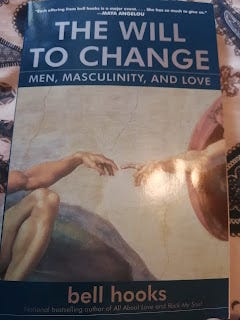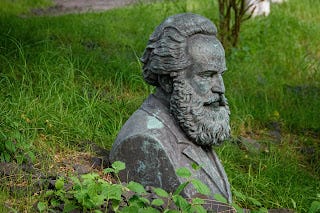What bell hooks Can Tell Us About the Red Pill
First and foremost: this is the first blog post in a while. I'd love to be able to say that I was off doing incredibly important things in lieu of blog writing, but truth be told I just let it hit the back burner.
Lately I've had trouble with memory recall and focus, symptoms I suspect stem from "long COVID", as it's been colloquially termed. In response, I've decided I'm going to try and write about what I'm reading in order to combat shit just coming to the forefront of my mind and then promptly leaving for good. Much of this writing is just going to be in my little reading journal, but if there's a topic suitable for a long form essay, I'll try and put it here.
With the recent wave of "red pill" content sweeping social media, particularly platforms like YouTube and tiktok, I decided to read bell hooks' "The Will to Change: Men, Masculinity, and Love", which the YouTube essayist/commentator Noah Samson recommended in one of his videos (https://www.youtube.com/c/NoahSamsen).

bell hooks was a prominent feminist author and social activist, and one of the champions of intersectional feminism. For those unaware, the term "intersectional" in this context basically means using a variety of critical lenses to comment on and critique culture, society, and the human experience. bell hooks, for example, practiced a feminism that synthesized and addressed a variety of elements of human experience, including race, sex, art, gender, capitalism, etc. She unfortunately just passed away last year (2021).

Red pill, coined from The Matrix (1999), is a term that has come to be adopted by an array of reactionary groups. In the film, the protagonist Neo is given a choice: Take the blue pill, and remain blissfully ignorant to the reality that you exist in a simulation; take the red pill, and wake up.
This analogy has been co-opted by the far-right, specifically the "manosphere", where the red pill now implies rejecting "woke" ideology, and adopting what is essentially just classical misogyny. The coup of this analogy is rather ironic, considering the Wachowskis have confirmed The Matrix is actually a trans metaphor, and not some reactionary fantasy. (https://www.bbc.com/news/newsbeat-53692435)

So, what does the "manosphere" actually believe? Wikipedia states that the groups identified with this ideology include: Men's Rights Activists (MRAs), incels (involuntary celibates), pick-up artists, etc. (https://en.wikipedia.org/wiki/Manosphere). It's not very hard to pin down what beliefs these people hold--usually some combination of misogyny and misandry. A common belief among the "manosphere" is that modern women have grown entitled, that they only care about money, that they need to be taken off the pedestal--so on and so forth. The entire ideology is devised to reduce women to one dimension, to ignore the many facets that make up a human life.
But the red pill is not only designed to generalize, to stereotype, and to demean women, but men as well. This is why you often hear rhetoric about "alpha" and "beta" males associated with red pillers. They believe that anyone coming to the defense of women, or "weak" men, are weak themselves. Those who challenge this are often called "sheep", or are told they are only doing it to achieve the favor of women ("white-knighting"). Red pillers believe the only way to engage with people is to dominate them, that all things in the world are there for the taking. No doubt, many have heard the term "toxic masculinity" in reference to these beliefs.
The prevalence of red pill content has exploded on social media, with people such as Andrew Tate, Sneako, and many other red pill clones' regurgitating hateful rhetoric, their videos pumped in a steady stream through YouTube and tiktok algorithms to impressionable young audiences. Luckily, Tate has been deplatformed, but my fear is that the damage has already been done. There have already been reports of teachers dealing with overt misogyny in the classroom, with kids reciting red pill rhetoric as early as elementary school.
There have been many people, much smarter and more articulate than me, who have made efforts to combat this harmful ideology. I'll link a playlist Noah Samson put together titled "Manosphere Deprogramming" in the bibliography. My wish is not to delve into each and every case of the "manosphere", but instead to try and uncover what bell hooks can reveal to us about red pill ideology.
"The Will to Change" is not a terribly complex book. It is not a philosophical treatise, nor is it a political manifesto. It is, at its core, a deeply personal endeavor for hooks, and a book fundamentally about pain; the author's, women's, men's, people's, ours. In many ways, the work sets out to act as a parachute, a lifeline to those who bell hooks believed feminism had left behind--men.
hooks' thesis is simple, and indeed stated quite clearly: "Men cannot love if they are not taught the art of loving." (hooks, xvii). She diagnosed the issue aptly:
It is true that masses of men have not even begun to look at the ways that patriarchy keeps them from knowing themselves, from being in touch with their feelings, from loving. To know love, men must be able to let go the will to dominate. (hooks, xvii)
Patriarchy is a system of severance; a soul dagger. It is a tool used to blunt the emotions of men because they are promised to be rewarded for doing so. An emotionless man is one who is better at violence, and violence is a currency. Men are taught to be violent, that violence, and dominance, is the sole way to affirm masculinity. It is why men make up around 90% of homicide perpetrators world-wide (https://www.unodc.org/unodc/en/data-and-analysis/global-study-on-homicide.html).
Patriarchy rewards men for being out of touch with their feelings. Whether engaged in acts of violence against women and children or weaker men, or in the socially sanctioned violence of war, men are better able to fulfill the demands of patriarchy if they do not feel. (hooks, 70)
It's important to note that hooks is not only referring to physical violence, but to emotional violence as well, often manifested in the architype of the quiet, disconnected patriarch who wields fear to dominate the household. "Fear keeps us away from love. And yet women rarely talk to men about how much we fear them[...]We cannot love what we fear. That is why so many religious traditions teach us that there is no fear in love." (hooks, 8-9)
hooks draws the distinction between male performance and male being: "Performance is different from simply being. in patriarchal culture males are not allowed to simply be who they are and to glory in their unique identity. Their value is always determined by what they do." This performance of masculinity is at its apex in the manosphere, the "primal dominance" of these men, their wealth, the women they surround themselves with, flaunted like peacock feathers. "When males are required to wear the mask of a false self, their capacity to live fully and freely is severely diminished. They cannot experience joy and they can never truly love." (hooks, 154).
This disconnection of the self cannot be sustainable. It cannot be sustainable because the consequences of these beliefs and behaviors are fatal. Men are not only violent to the other, but to themselves, making up 75% of suicides in Canada (https://mentalhealthcommission.ca/resource/mens-mental-health-and-suicide-in-canada-key-takeaways/#:~:text=Of%20the%20estimated%204%2C000%20suicide,75%20per%20cent%20are%20men.)
The violence and dominance encouraged in men is predicated by an underlying rage. hooks notes that under patriarchy, boys and men have been severed from their feelings, from their capacity to connect with others emotionally. They are left with only one emotion to reckon with the world. "Boys are encouraged by patriarchal thinking to claim rage as the easiest path to manliness." (hooks, 44). Anger is permitted by a patriarchal society; rage is encouraged in boys. When girls get angry, or externalize their rage, they are "emotional", but when boys do it, they are "just being boys".
Today small boys and young men are daily inundated with a poisonous pedagogy that supports male violence and male domination, that teaches boys that unchecked violence is acceptable, that teaches them to disrespect and hate women. (hooks, 51)
For hooks, misogyny is displaced male anger. Men have traditionally been compensated for shedding their feeling selves with promotions and subservient partners and children, but they are still dissatisfied with their end of the deal. The promises that patriarchy makes for men--that men wield the powers of society--seldom come true for the majority. At work and in life they are often powerless, themselves dominated by the elite few, unfulfilled--cucked by the system they were told they were prince to. Their expectations are subverted, leading to disappointment. That disappointment turns to anger; anger turns to an actionable rage utilized to gain power in realms they can dominate: in the household, in relationships, in sex. Indeed, that is why so many men are enamored with patriarchal porn; it is a fantasy realm in which dominance and power are righteous.
If patriarchy were truly rewarding to men, the violence and addiction in family life that is so all-pervasive would not exist. This violence was not created by feminism. If patriarchy were rewarding, the overwhelming dissatisfaction most men feel in their work lives--a dissatisfaction extensively documented[...]would not exist." (hooks, 31)
I think the issue that hooks is driving at, is that patriarchy teaches men that their worth, their selfhood, can only be validated externally, and they are only worthy if they are dominating. "Patriarchal masculinity teaches men that their selfhood has meaning only in relation to the pursuit of external power[.]" (hooks, 116).
Much like how hooks argues patriarchy functions to sever men from their emotional selfhood, Marx says capitalism functions to severs people from what makes them human. With his theory of alienation Marx argued that under capitalism people are estranged from their humanity--what is human (creativity, production, connection) is made animal, and what is animal (nourishment, sex, sleep) is made human. With one's labour used as a means to an end and not an end in itself, one goes to work and dreams of going home to eat, sleep and fuck, instead of relishing in the uniquely human ability of creation and production. Perhaps hidden here is an explanation for the manosphere's obsession with primitivity, and the animal kingdom; they believe what makes them most human is their animalistic drives.

For bell hooks, this cycle of producing angry, violent, disconnected men is an existential threat: "The warrior's way has led men in the direction of an impoverishment of spirit so profound that it threatens all life on planet Earth." (hooks 170). This ethos of dominance and exploitation not only affects the personhood of everyone, but the climate, the planet, and life itself.
It is the repression and excision of the feeling self that leaves men empty and in constant need of affirmation, and it is only through the reconnection of the emotional self that they can be made whole again. Only until we address patriarchy and its symptoms, can we begin to combat it.
To love boys rightly we must value their inner lives enough to construct worlds, both private and public, where their right to wholeness can be consistently celebrated and affirmed, where their need to love and be loved can be fulfilled. (hooks, 54)
The anger and disappointment of powerless men is the crux of their own damnation. They curse feminism, "wokism", women and "weak" men for their unfulfilling, unrewarding lives, when that anger should be directed at the systems that have ensured they not be whole, integral beings. They lash out in bitter throes because their soul is in pain. Indeed, they are doing the only thing they know how, the only thing they were taught to do: punch down.
It stands to reason that if someone is a misogynist, they probably won't take criticism from woman seriously. We need more men to call out this harmful rhetoric, and more spaces of positive masculinity where young men can explore their personhood and masculinity without being radicalized by far-right pipelines that incite hatred.
Mass media are a powerful vehicle for teaching the art of the possible. Enlightened men must claim it as the space of their public voice and create a progressive popular culture that will teach men how to connect with others, how to communicate, how to love. (hooks, 134)
It must be said that this is by no means an entire account of "The Will to Change", and I'm sure there's some points that I haven't covered with enough thoroughness or rigor. I am just very concerned about the rising tides of bigotry in the world right now, as many are, and I want to try and do my best with what I can to challenge it, or, at the very least, provoke some discourse.
I know this was pretty rambly and not very cohesive but, like I said, this was more an exercise in reflection rather than a think-piece. Feel free to let me know what you think in the comments!
Bibliography:
https://youtube.com/playlist?list=PLrAlewEkt7cFGvDfu_3SidUMf3T9E9kbj&si=EMSIkaIECMiOmarE6JChQQ
hooks, bell, 1952-2021. The Will to Change: Men, Masculinity, and Love. New York: Atria Books, 2004.

